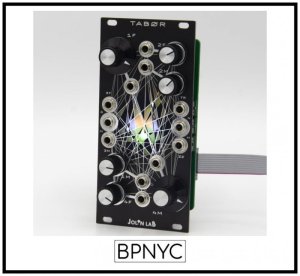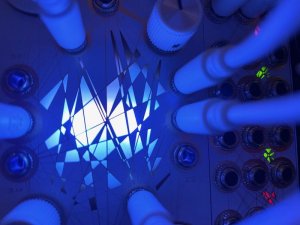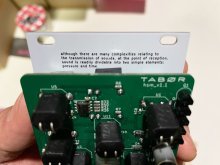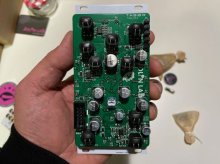Jolin Lab TABØR Black Mirror - Avalanche Drone Rhythmic Oscillator
TABØRは途切れのない発振状態の4つのなだれトランジスタの予測不可能性に基づいた、リズミカルなアナログサウンドとCV音源です。
これらの予測不可能なコアオシレーターは互いに関連しており、その飽和と放電のサイクルが複雑でリズミカルなサウンドテクスチャーを生み出しています。外部のCV入力でコントロールしたりトリガーしたりして、さらに複雑にしたりすることができます。
この回路で意図的に立ち上がりパルスのリズミカルなテクスチャーを得ることができます。そして、LEDの色やコンデンサーの値を混ぜることで異なる音の高さを表現しています。単体のオシレータの波形はフィルターされておらず、基本はノコギリ波です。サウンドエンジン全体をFM変調した結果は素晴らしいカオスとなります!
特徴
4つのなだれオシレーターにそれぞれ2つのコントロール:
F:一つのノコギリ波のスパイク間の距離調整 (立ち上がりパルスの周波数)
M:各コアが他のコアの中でどれだけクロスモジュレーションするか
各オシレータは色で識別され、他のオシレーターの状態に応じて異なる動作をします:
OSC1(緑LED):最もパーカッシブで主要な基本的となるモジュレータ
OSC2(黄LED):OSC1にリズミカルに従属し直系列なキャリア
OSC3(赤LED):OSC2と密接に関連していますが、OSC1をモジュレータとして無効にします
-主要なOSC1から独立していることと、通信のバランスを保つために、OSC3にはFとMのコントロールポテンショメータがありません。その値は外部CV入力でのみ変更可能です。
OSC4(橙LED):フィルタリングしたり、コミュニケーション全体を遮断したりするためのシャッターとして機能
*これらの可変はすべて、バクトロールCV入力で個別に制御できます。
モジュールの中央にある円の中にオシレータの鼓動が視覚的に確認できます。
サウンドエンジンが発振したりコミュニケートしたりするためには、16〜22V程度の電圧が必要で、それ以下の値になると階層的に動作が停止します:
RM:この入力はオシレータのアッテネータとして機能し、電源を制限します。
-ダミーケーブルを使用すると、この入力の反転バクトロール構成のためオシレータが停止します。
サウンドエンジン全体の結果は3つの異なる出力から与えられます:
TR:(青LED)”sqarified”常に正の0~7Vトリガー/CVソース
-この出力は常にアクティブではなく、なだれエンジンが一定のしきい値に達したときにトリガーを発し、青色LEDが点滅します。
NM:オシレーターから直接出力されるドライなミックスオーディオ信号
ZZ:内蔵のダイオードベースの歪み回路からの補助的なファズエンベロープ出力
- 12 HP
- 深さ29 mm
- 65 mA +12V
- 7 mA -12V
- 0 mA 5V
TABØR is a rhythmic analogue sound and CV source based on the unpredictability of four avalanche transistors in a continuous oscillation state.
These unpredictable core oscillators are related to each other and their charge and discharge cycle creates complex rhythmic sound textures that can be controlled and triggered with external CV inputs to add more contamination.
With this circuit we can obtain rhythmic textures- intended as rise pulses – and different tone heights by mixing the colors of the LEDs and the values of the capacitors. The waveform of a single oscillator, unfiltered, is basically a sawtooth. The result of the FM modulation of the whole sound engine is chaotic.
Features
Four avalanche oscillators with two controls each:
F: regulates the distance between the spikes of the single sawtooth waves - their rise pulses frequency
M: the amount of cross-modulation of each core within the others
Each oscillator can be identified thanks to its color and it can acts differently depending on the state of the others:
OSC1: the most percussive and predominant, the fundamental modulator
OSC2: obedient to OSC1 rhythmically and its direct subsidiary - a carrier
OSC3: strictly related to OSC2 but can set-aside OSC1 as a modulator
Due to its autonomy from the fundamental OSC1 and to keep the communication balanced, OSC3 doesn't have the F and M control potentiometers. Its values can be changed only with external CV input
OSC4: it can act as a shutter to filter or interrupt the whole communication
these variables can all be controlled individually with vactrol CV inputs
Visually you can see the "beating" oscillators in the hollow circle in the middle of the module.
To start oscillate and communicate the sound engine needs around 16v to 22v and any value below that point will stop hierarchically its operation:
RM: this input act as an attenuator to the oscillators, limiting their power supply
A dummy cable will shut down the oscillators due to the inverted-vactrol configuration of this input. The RM input can be used as an internal voltage-controlled-attenuator, a VCA
The result of the whole sound engine is given in three different outputs:
TR: a “squarified” always positive 0-7v trigger / cv source
This output is not always active, it fires triggers when the avalanche engine reaches a certain threshold: blue LEDs blinking
NM: the dry mixed audio signal straight out of the oscillators
ZZ: an auxiliary fuzzed envelope output from the internal diode-based distortion circuit
- 12 HP
- 29 mm deep (Through-hole Full Kit 45mm)
- 65 mA +12V
- 7 mA -12V
- 0 mA 5V


販売価格: 52,348円 [通常販売価格: 56,900円]








